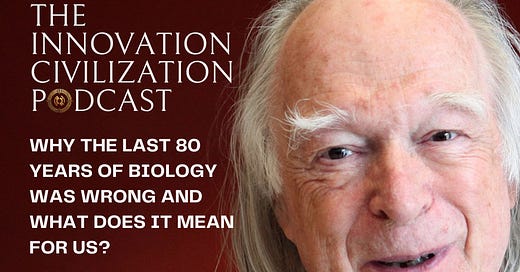Listen now on Apple, Spotify, and YouTube.
Science progresses one funeral at a time. We all know that. A similar one is coming soon in the field of biology. Theories need to be trashed, and textbooks would need to be updated.
We're joined by Dr. Denis Noble, Professor Emeritus of Cardiovascular Physiology at the University of Oxford, and the father of 'systems biology'. He is known for his groundbreaking creation of the first mathematical model of the heart's electrical activity in the 1960s which radically transformed our understanding of the heart.
Dr. Noble’s contributions have revolutionized our understanding of cardiac function and the broader field of biology. His work continues to challenge long-standing biological concepts, including gene-centric views like Neo-Darwinism.
In this episode, Dr. Noble discusses his critiques of fundamental biological theories that have shaped science for over 80 years, such as the gene self-replication model and the Weissmann barrier. He advocates for a more holistic, systems-based approach to biology, where genes, cells, and their environments interact in complex networks rather than a one-way deterministic process.
Key Takeaways from the Episode:
Rethinking 142 Years of Biology:
Denis Noble challenges the longstanding ideas of biology, dating back to 1883. Concepts like DNA’s self-replication and the Weismann Barrier are fundamentally flawed. DNA doesn't replicate itself—it's an active process carried out by living cells, and biology needs a major rethink.
AI Struggles to Replicate Life:
AI’s inability to replicate even simple organisms highlights the complexity of biological processes. Organisms like bacteria react to their environments in ways far beyond what AI can handle. Integrating mechanical, electrical, and chemical reactions makes biological systems extremely hard to mimic.
Life Isn't Algorithmic:
The complexity of life and its interactions with the environment can’t be boiled down to algorithms. With trillions of molecular interactions happening every second, replicating biological systems on a computational level is almost impossible.
Genes Aren't the Whole Story:
Noble debunks the idea that genes alone control development. He emphasizes the importance of the environment, membranes, and cellular reactions in determining what happens inside our bodies. Genes are just one part of a vast interconnected network.
Neo-Darwinism Is Outdated:
While natural selection is real, the reductionist gene-centric view of neo-Darwinism is incomplete. Evolution isn't purely deterministic; it's driven by both genes and environmental interactions. Noble calls for a shift in the evolutionary paradigm to incorporate these insights.
Epigenetics as a Game-Changer:
The idea that our bodies can pass on acquired traits through mechanisms like vesicles challenges the conventional understanding of inheritance. This opens the door for epigenetics to play a central role in evolutionary theory, potentially replacing some outdated concepts.
Health Implications Beyond Genetics:
The promises of the Human Genome Project—curing diseases like cancer and Alzheimer's—haven't materialized as expected. Noble suggests that instead of focusing solely on genetics, more attention should be paid to physiological networks and lifestyle changes for promoting health and longevity.
Plants and Traditional Remedies Hold Untapped Potential:
Many successful modern drugs originated from plants. Noble suggests that revisiting traditional remedies and plant-based treatments could unlock new, more effective medical solutions. The pharmaceutical industry might benefit from studying nature’s time-tested interactions with humans and other species.
System Biology vs. Reductionism:
Noble’s work in systems biology promotes a holistic view of life—where multiple processes work in concert, like a symphony. This approach challenges the purely reductionist perspective and calls for integrating both reductionism and holistic thinking in scientific research.
Join us for a thrilling discussion on the future of biology, evolution, and the practical implications for health and science.
Follow our host, Waheed Rahman (@iwaheedo), for more updates on tech, civilizational growth, progress studies, and emerging markets.
Timestamps:
(00:00) - Intro
(03:04) - Why Was The Last 80 Years of Biology Wrong?
(08:17) - Where does Logic come from?
(13:03) - Is Evolution Truly Random or Driven by Purpose?
(22:05) - Is Nurture more important than Nature?
(29:06) - Denis Noble calls for a rewrite of all Biology textbooks
(32:48) - Is Neo-Darwinism Just a Model? Understanding the Difference Between Evolution and the Creationism Debate
(39:22) - Natural Selection vs. Lamarckian Evolution: How Darwin Changed Our Understanding of Survival Traits
(46:03) - Reductionism vs. Integrationism in Science: How the 'Third Way' Challenges Neo-Darwinism
(49:43) - What Does Epigenetics Mean for the Average Person? How Denis Noble's Paradigm Shift Impacts Everyday Health and Life?
(69:29) - Is Western Science Facing a Paradigm Shift? Rethinking How We Determine Truth and Health in Light of Eastern and Western Influences
(75:21) - Why Reductionism Dominates Science: The Political and Practical Challenges of Embracing a Systems Biology Approach
(82:49) - Can We Trust AI to Behave Ethically? The Need to Connect Philosophy with Technology in AI Development
(86:46) - Outro
















Share this post